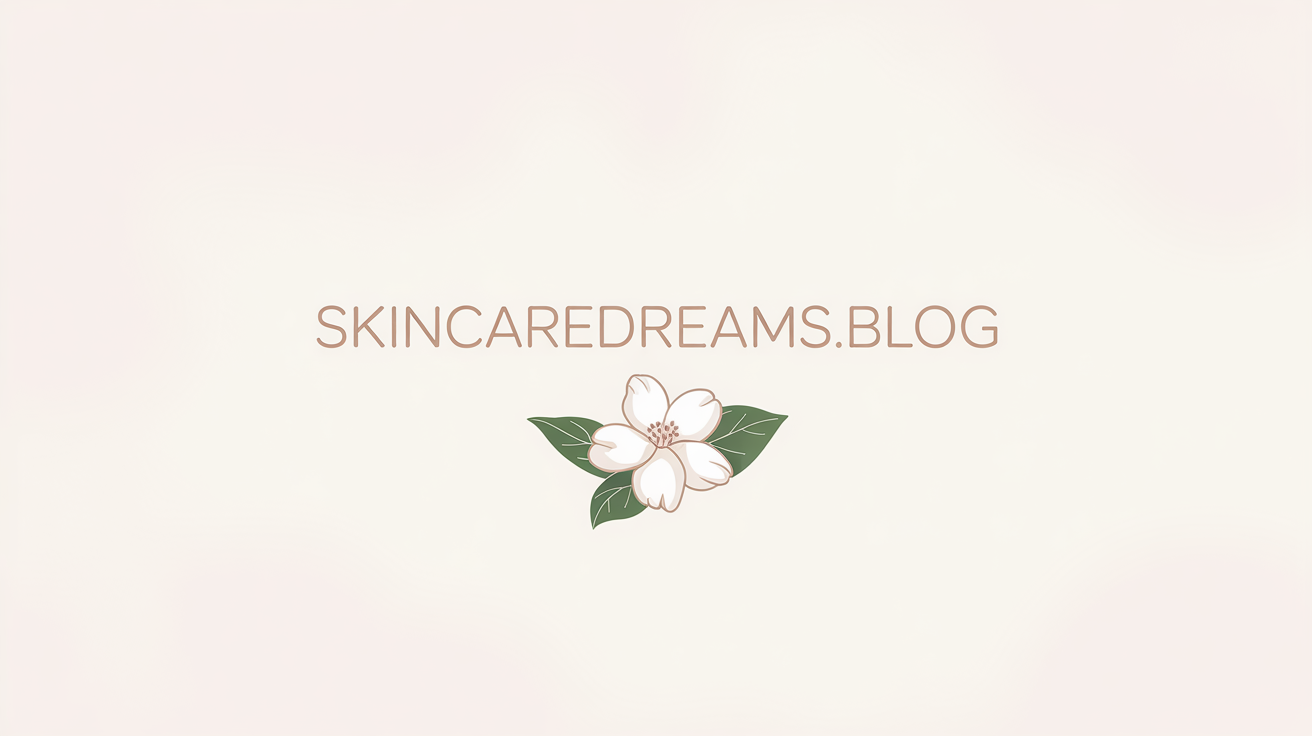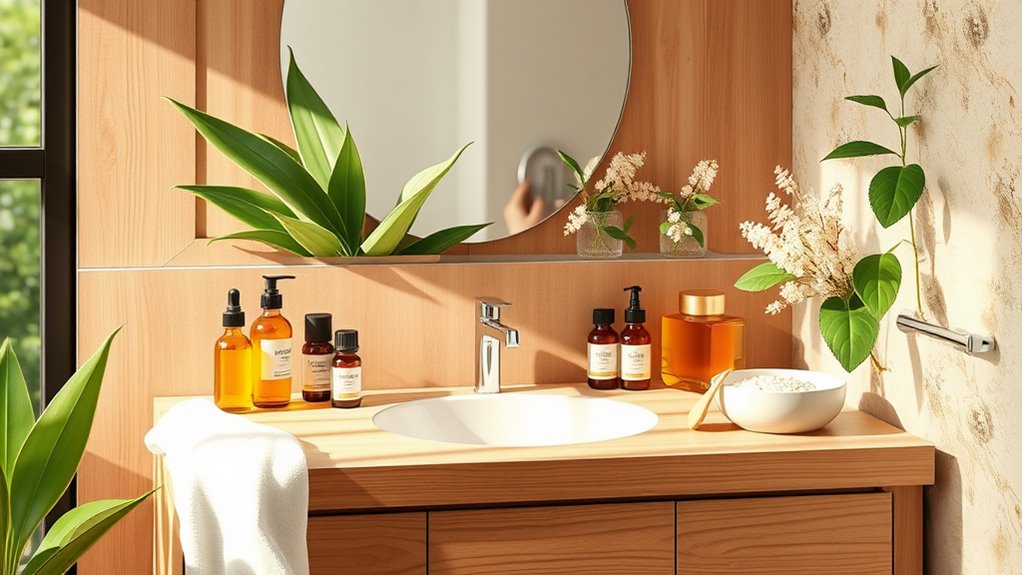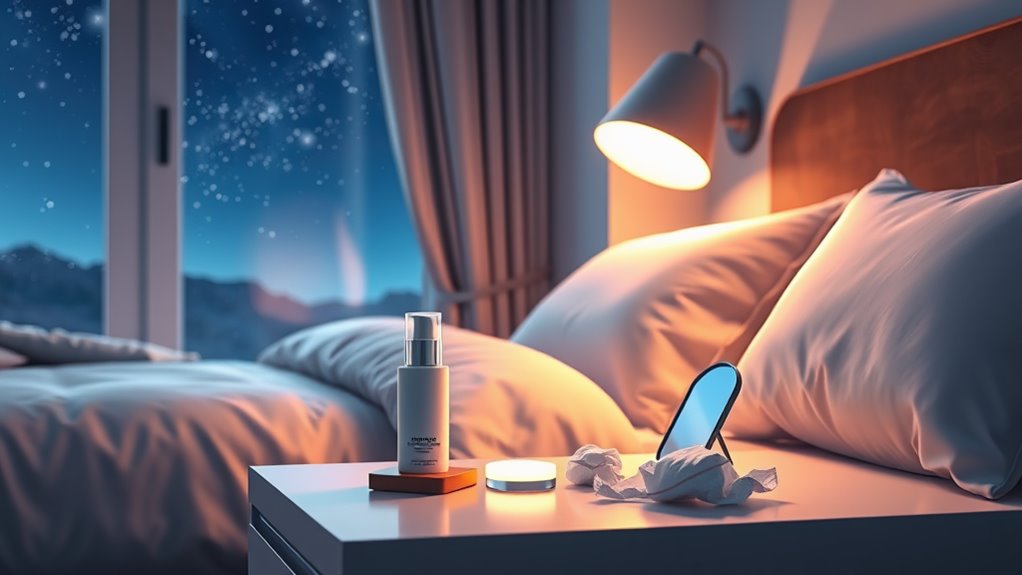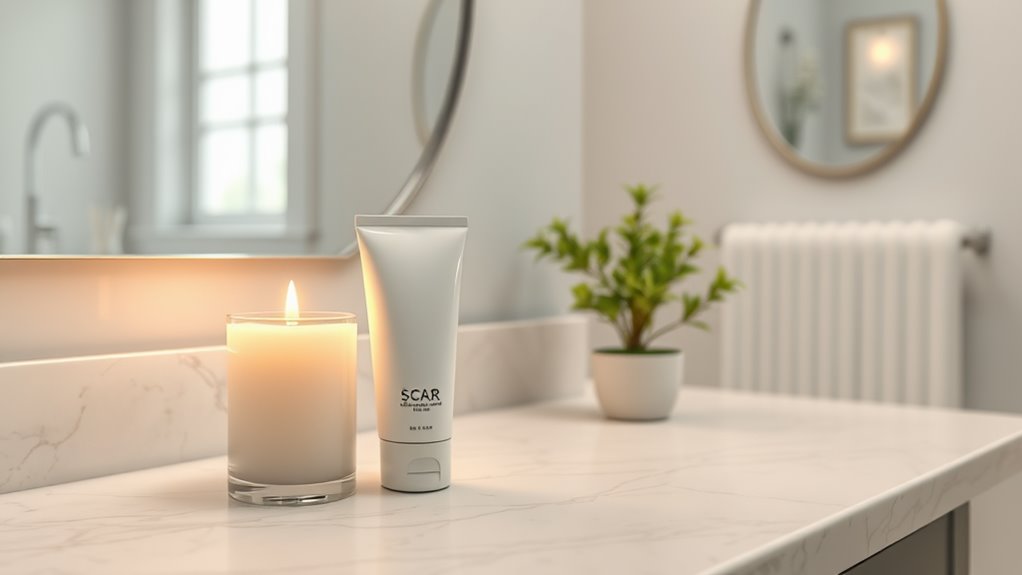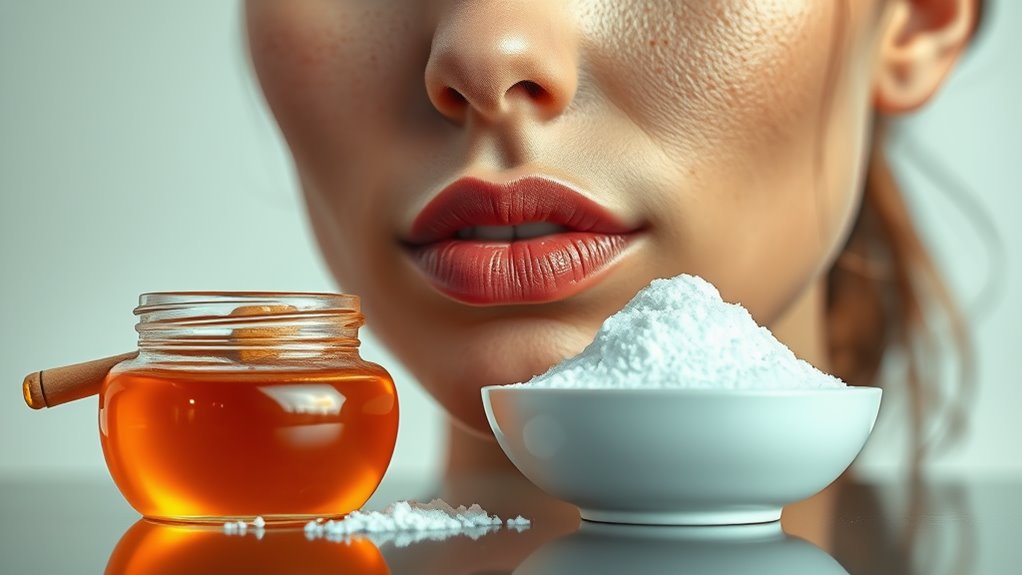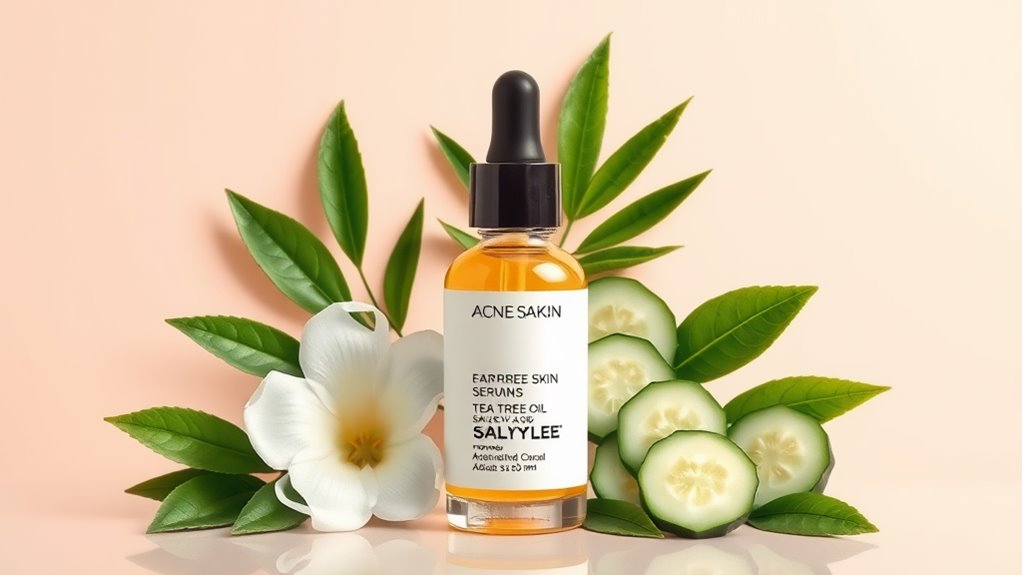How to Fade Acne Scars Naturally at Home
If you’re struggling with acne scars, you’re not alone. Many people seek natural solutions to fade these marks, opting for remedies that are gentle on the skin. By incorporating certain ingredients and techniques into your routine, you can promote healing and brighten your complexion. Curious about which methods might work best for you? Let’s explore some effective strategies that can help you achieve clearer skin.
Key Takeaways
- Use tea tree oil and lavender oil to reduce inflammation and prevent future breakouts, promoting clearer skin.
- Incorporate rosehip oil for skin regeneration and enhanced collagen production, aiding in scar fading.
- Create a honey and lemon mask for brightening and exfoliating, leveraging honey’s antimicrobial properties.
- Exfoliate gently with sugar or oatmeal scrubs 1-2 times a week to remove dead skin cells and improve texture.
- Maintain sun protection with sunscreen to prevent scars from darkening and support healing processes.
Understanding Acne Scars
Acne scars can feel like unwelcome reminders of past breakouts, affecting your skin’s appearance and confidence. Understanding these scars is essential for effective spot correction.
When you experience acne, the skin often undergoes inflammation, leading to changes in texture and pigmentation. This process can result in two main types of scars: atrophic (depressed) scars and hypertrophic (raised) scars.
Atrophic scars, such as icepick or boxcar scars, create dimples in your skin, while hypertrophic scars can form raised bumps. To master scar treatment, you need to identify which type you’re dealing with, as this influences your approach to spot correction.
Each scar type has unique characteristics, and recognizing these will empower you to choose the most effective fading techniques for your skin. Incorporating proven ingredients known for their efficacy can further enhance your scar fading journey.
Natural Ingredients for Fading Scars
When it comes to fading scars, natural ingredients can work wonders.
Essential oils and herbal remedies offer unique benefits that can help improve your skin’s appearance.
Let’s explore how these natural solutions can support your journey to clearer skin.
Essential Oils Benefits
Essential oils offer a natural and effective way to help fade acne scars, especially when you incorporate them into your skincare routine. Oils like tea tree, lavender, and rosehip are renowned for their skin-repairing properties.
Tea tree oil’s antibacterial nature can prevent future breakouts, while lavender oil soothes inflammation and enhances healing. Rosehip oil is packed with vitamins A and C, promoting skin regeneration and collagen production.
To use, mix a few drops with a carrier oil, like jojoba or coconut oil, and apply it directly to the scars. Consistency is key; apply daily for best results.
With patience and dedication, you’ll harness the power of essential oils to achieve smoother, clearer skin.
Herbal Remedies Overview
While many people turn to commercial products for skincare, herbal remedies offer a natural alternative for fading scars.
You can harness the power of ingredients like aloe vera, known for its soothing and healing properties, or turmeric, which contains curcumin to reduce hyperpigmentation.
Honey acts as a natural moisturizer and promotes cell regeneration, while witch hazel can help diminish inflammation and redness.
Additionally, rosehip oil is packed with essential fatty acids and vitamins that aid in skin repair.
Incorporating these herbs into your routine can boost your skin’s healing process, providing you with a holistic approach to scar treatment.
DIY Remedies Using Kitchen Staples
You can create effective DIY remedies for fading acne scars using common kitchen staples.
A honey and lemon mix can brighten your skin, while aloe vera provides soothing hydration.
Let’s explore how these simple ingredients can help you achieve clearer skin.
Honey and Lemon Mix
Many people turn to natural remedies for fading acne scars, and a honey and lemon mix is a powerful option. This combination harnesses the antibacterial properties of honey and the exfoliating effects of lemon, promoting skin healing.
Here’s how you can make the most of it:
-
Antimicrobial Action: Honey helps reduce bacteria, preventing further breakouts while aiding scar healing.
-
Natural Exfoliant: Lemon contains citric acid, which gently exfoliates the skin, removing dead cells and promoting cell turnover.
-
Brightening Effect: The acidity of lemon helps lighten hyperpigmentation, resulting in a more even skin tone.
Mix equal parts honey and lemon juice, apply it to your scars, and let it sit for about 20 minutes before rinsing. You’ll love the results!
Aloe Vera Application
If you’re looking for an effective way to fade acne scars, aloe vera is a fantastic option that’s easily accessible in your kitchen.
Simply cut a fresh aloe vera leaf and scoop out the gel. Apply the gel directly to your scars using clean fingertips, gently massaging it in circular motions. Let it sit for about 30 minutes before rinsing with lukewarm water.
For enhanced benefits, consider combining aloe vera with a few drops of tea tree oil or honey for added antibacterial properties. Repeat this treatment daily for ideal results.
With consistent application, you’ll notice your scars gradually fading, revealing smoother, healthier skin. Embrace this natural remedy and take control of your skincare routine!
The Power of Essential Oils
While various treatments exist for fading acne scars, essential oils stand out for their natural healing properties.
These concentrated plant extracts not only promote skin regeneration but also reduce inflammation and enhance overall skin health. Incorporating essential oils into your routine can greatly boost your efforts in achieving smoother skin. Additionally, using essential oils regularly can help combat dark spots and hyperpigmentation, leading to a more even skin tone over time.
-
Tea Tree Oil: Known for its antibacterial properties, it helps prevent further breakouts and promotes healing.
-
Lavender Oil: This calming oil aids skin regeneration and soothes irritation, making it perfect for sensitive skin.
-
Rosehip Oil: Rich in vitamins A and C, it encourages collagen production and improves skin texture, effectively fading scars.
Embrace the power of these oils, and you’ll be well on your way to mastering scar fading naturally.
Gentle Exfoliation Techniques
To effectively fade acne scars, incorporating gentle exfoliation techniques into your skincare routine is essential.
Start with a mild exfoliant, like a natural sugar or oatmeal scrub, which removes dead skin cells without irritating your skin. Aim to exfoliate 1-2 times a week for best results.
Additionally, consider using chemical exfoliants containing alpha-hydroxy acids (AHAs) or beta-hydroxy acids (BHAs). These can help brighten your complexion and promote cell turnover. Always patch-test new products to avoid adverse reactions.
Following exfoliation, apply a soothing serum to help calm your skin.
Hydration and Skin Care Routine
Maintaining proper hydration is essential for your skin’s health, especially when it comes to fading acne scars. When your skin is well-hydrated, it can repair itself more effectively, promoting a smoother appearance.
To enhance your hydration and skin care routine, consider these key practices:
- Drink plenty of water daily to keep your skin cells plump.
- Use a gentle, hydrating moisturizer that suits your skin type to lock in moisture.
- Incorporate serums with hyaluronic acid or glycerin to draw moisture into your skin.
Lifestyle Changes for Better Skin
Making simple lifestyle changes can greatly improve your skin’s health and help fade acne scars.
Start by prioritizing a balanced diet rich in antioxidants, vitamins, and healthy fats. Foods like berries, nuts, and leafy greens nourish your skin from within.
Don’t underestimate the power of sleep; aim for seven to eight hours nightly, as it allows your skin to repair itself.
Incorporate regular exercise into your routine to boost circulation and promote detoxification.
Limit your intake of sugar and processed foods, as they can cause inflammation.
Finally, manage stress through practices like meditation or yoga, since stress can exacerbate skin issues. Additionally, maintaining youthful skin can be supported by avoiding habits that accelerate aging, such as excessive sun exposure and smoking.
Preventive Measures for Future Scarring
While it’s impossible to control every factor that affects your skin, taking proactive steps can greatly reduce the risk of future scarring.
You have the power to influence your skin’s health through mindful practices. Focus on these key preventive measures:
-
Avoid Picking or Squeezing: This can lead to deeper inflammation and increase the likelihood of scarring.
-
Use Non-Comedogenic Products****: Opt for skincare and makeup that won’t clog your pores, reducing breakouts.
-
Protect Your Skin from the Sun: UV rays can darken scars and hinder healing, so always apply sunscreen.
Frequently Asked Questions
How Long Does It Take to See Results From Natural Remedies?
When using natural remedies, you’ll typically see results within 4 to 12 weeks, depending on your skin type and consistency. Patience is key, so stick with your routine and monitor your progress regularly.
Can Certain Foods Worsen Acne Scars?
Certain foods can indeed worsen acne scars. Processed sugars, dairy, and high-GI foods may trigger inflammation, leading to more breakouts and prolonged healing. You’ll want to focus on a balanced diet to support skin health effectively.
Are There Any Side Effects of Natural Treatments?
Natural treatments can cause side effects like skin irritation or allergic reactions. You should always patch-test new ingredients and consult a dermatologist to guarantee your chosen method suits your skin type and won’t cause harm.
Is Sun Exposure Harmful During the Healing Process?
Yes, sun exposure can hinder your healing process. UV rays may darken scars and increase inflammation. It’s best to protect your skin with sunscreen and avoid direct sunlight to promote ideal healing and recovery.
Can Stress Impact the Healing of Acne Scars?
Yes, stress can greatly impact your healing process. When you’re stressed, your body produces cortisol, which may hinder skin regeneration. Managing stress through techniques like mindfulness can enhance your skin’s recovery and overall health.
Conclusion
Fading acne scars naturally at home is totally achievable with the right approach. By incorporating gentle remedies, essential oils, and regular exfoliation into your skincare routine, you can promote healing and improve your skin’s appearance. Don’t forget to stay hydrated and protect your skin from the sun. With patience and consistency, you’ll see significant improvements over time. Embrace these natural methods and enjoy healthier, more radiant skin!
